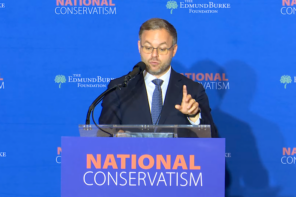Religious right organizations that oppose marriage equality for gays and lesbians are ecstatic over the California Supreme Court decision granting legal standing to the backers of the state’s Proposition 8. That means the appeal of Judge Vaughn Walker’s decision striking down the ballot measure that reinstated a ban on marriage equality in the state. The Ninth Circuit Court of Appeals is expected to issue its ruling on the appeal soon – setting the stage for a possible decision by the U.S. Supreme Court
Brian Brown at the National Organization for Marriage was so excited he called the coming high court battle the “Roe v. Wade of marriage.”
Imagine the damage to the gay marriage movement when the US Supreme Court rules definitively that the US Constitution does NOT contain a right to same-sex marriage! This case could become the pivotal moment in the entire battle.
What makes Brown so giddy about the prospect of SCOTUS taking up the measure? The fact that the majority of the justices are Roman Catholic. Brown, and his co-horts, are already banking on the justices showing more deference to their religious beliefs than to the law. Currently, the court has six Catholics on the bench – Samuel Alito, Anthony Kennedy, Antonin Scalia, Clarence Thomas, Sonia Sotomayor and Chief Justice John Roberts.
Their glee is probably bolstered by the recent efforts of U.S. Conference of Catholic Bishops’ new “religious liberty” effort to paint abortion and gay rights as an affront to their right to discriminate based on religious beliefs. Their new Web site even points out that “contemporary laws that ‘redefine’ marriage to include two persons of the same sex threaten to stifle the Church’s ability to teach publicly about and witness to the uniqueness of marriage as a lifelong bond between one man and one woman.” Which is ridiculous. They can still say what they want. What’s really threatened is their authority to have control the bodies of other people and have their views accepted uncritically as “the Truth.”
Brown, and his allies, however, are banking on at least four conservative Catholic votes on the high court to be a no-brainer for the reinstatement of Prop 8 – a decision that would set marriage equality efforts back for decades.
As Gabriel Arana points out over that The American Prospect notes, the swing vote here will most likely be Anthony Kennedy. According to Arana, the fear that SCOTUS will hand a win to Prop 8 supporters is probably keeping a few gay activists up at night – wondering if the marriage issue was the right one to use to challenge gay inequality.
The more reasonable fear is that the Supreme Court, unlike in Roe, is behind public opinion on gay rights; it was only eight years ago that sodomy was illegal in Texas. Gay-rights supporters have their hopes pinned on Kennedy, who wrote the majority opinion in the case that decriminalized sodomy, Lawrence v. Texas.
Some of the issues are the same in the Prop 8 case. The American Foundation for Equal Rights – and the attorneys hired to defeat Prop 8 – have argued that it Prop 8 unconstitutional on the grounds that it “violates the Due Process Clause of the Fourteenth Amendment by impinging on fundamental liberties.”
This is the central issue in Lawrence v. Texas. In that case, Kennedy found that in Bowers v. Hardwick , the case that had previously upheld sodomy laws, that the court had erred in its interpretation of the 14th amendment.
To say that the issue in Bowers was simply the right to engage in certain sexual conduct demeans the claim the individual put forward, just as it would demean a married couple were it said that marriage is just about the right to have sexual intercourse. Although the laws involved in Bowers and here purport to do no more than prohibit a particular sexual act, their penalties and purposes have more far-reaching consequences, touching upon the most private human conduct, sexual behavior, and in the most private of places, the home. They seek to control a personal relationship that, whether or not entitled to formal recognition in the law, is within the liberty of persons to choose without being punished as criminals. The liberty protected by the Constitution allows homosexual persons the right to choose to enter upon relationships in the confines of their homes and their own private lives and still retain their dignity as free persons.
Kennedy quotes from Justice John Paul Stevens’ dissent on Bowers that: “(1) the fact a State’s governing majority has traditionally viewed a particular practice as immoral is not a sufficient reason for upholding a law prohibiting the practice, and (2) individual decisions concerning the intimacies of physical relationships, even when not intended to produce offspring, are a form of ‘liberty’ protected by due process.”
Given the strength of the arguments made by Kennedy and Stevens in both the Lawrence and Bowers cases, it would seem clear that the court has held in the past that the “morality” of an action should not hold sway over the law and that the right to privacy of couples should take precedence over the state’s interest in “procreation” that is touted by marriage equality opponents. The arguments made in court by Prop 8 supporters to withhold marriage rights from gays and lesbians revolved mainly around “morality” and “procreative” issues – which the Supreme Court has already ruled cannot pass constitutional muster.
Given the court’s actions in the past, I think Brown’s end zone celebration might be tad premature. The Supreme Court always has the ability to issue surprising decisions that go against the grain of conventional wisdom and predictions. If Kennedy still believes what he wrote in the Lawrence decision and can make his arguments to the other justices based strictly on the law, perhaps the other justices can be convinced that no one truly has any liberty until we all do, regardless of religious beliefs.




